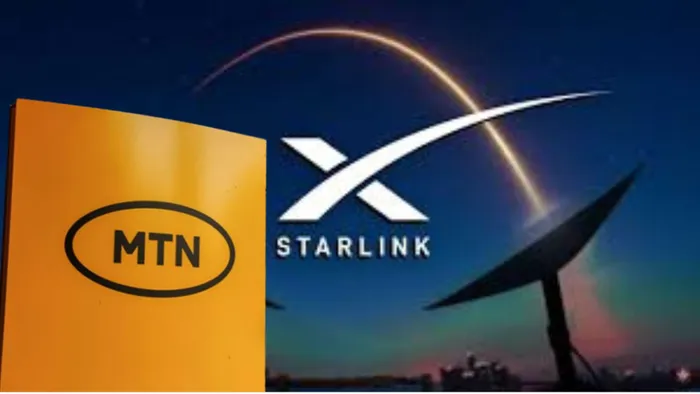
MTN is already partnering with several Low Earth Orbit (LEO) communication providers, including Starlink, in select markets across our footprint for backhaul services.
Image: Sizwe Dlamini/Canva
MTN has reacted to an article published in the Sunday Tribune, the Sunday Independent and their respective online platforms regarding its relationship with Starlink, potential market entry into South Africa, regulatory concerns, and the broader implications for connectivity across the continent.
On the current status of engagements between MTN and Starlink, if these include South Africa, MTN stated: “MTN is already partnering with several Low Earth Orbit (LEO) communication providers, including Starlink, in select markets across our footprint for backhaul services. These engagements have delivered encouraging results and continue to evolve as we explore opportunities to enhance connectivity and resilience in remote and underserved areas.”
This does not suggest that the telecommunications giant is in an exclusive deal with Elon Musk’s Starlink. “While we do not comment on confidential market-specific discussions, MTN embraces the value of LEO satellite systems and remains open to partnerships that support the extension of connectivity across Africa, including South Africa, in compliance with applicable regulations,” MTN said.
The telecommunications company said it was also looking at use cases that would enable higher availability of key services like MoMo using LEO in the event of subsea cable system outages.
“As we said along with our Q1 2025 trading update on May 12, as part of our work to extend digital and financial inclusion in our 16 markets, we are deepening our collaboration to extend connectivity to more rural and remote areas, as well as to improve resilience.
“MTN remains committed to working collaboratively with LEO communication providers to develop mutually beneficial solutions that enhance connectivity and service offerings across our markets. In this regard, we welcome partnership models with LEO communication providers to operationalise and improve time to market by being the distributors of the connectivity that their technology provides.”
On the question of what South Africa’s benefit would be if Starlink were granted a licence, MTN responded: “The inclusion of LEO satellite operators in South Africa within a well-regulated framework could significantly accelerate connectivity, particularly in rural and underserved areas where terrestrial infrastructure is limited or costly to deploy.
The emphasis MTN makes is on LEO and not Starlink exclusively. “By providing high-speed, low-latency internet, leveraging LEO capabilities could bridge the digital divide, supporting South Africa’s national goals of broader digital inclusion, economic development, and innovation,” MTN said.
On whether MTN would benefit from Starlink operating in the country, MTN's response was: “MTN welcomes cooperation and competition in the telecommunications space, provided there is regulatory parity. We believe that partnerships with LEO communication providers, including Starlink, can be mutually beneficial, enhancing service resilience, extending reach, and improving customer experience, particularly in geographically challenging regions.
“On the consumer front, working together with LEO satellite providers will help us to augment network access, especially in underserved areas, through direct-to-cellular technology. MTN South Africa has successfully conducted Africa's first satellite-to-unmodified mobile handset call trial in collaboration with Lynk Global.”
On MTN group chairperson Mcebisi Jonas’s participation in any negotiations regarding Starlink in South Africa, MTN explicitly stated: “No. In his capacity as MTN Group chairperson, Jonas does not participate in operational negotiations relating to Starlink or any other specific vendor or technology partner. His responsibilities are focused on providing strategic oversight and governance at the MTN Group level, in line with the role of a non-executive chairperson.”
Jonas was appointed as South Africa’s special envoy to the United States in April 2025, tasked with advancing diplomatic and trade priorities. While his dual role as MTN chair and presidential envoy has been noted, there is no evidence that he used either position to negotiate directly with Starlink or influence policy specifically for its benefit.
Regarding MTN’s view on allegations that the South African government was assisting Starlink without observing B-BBEE requirements, the telecommunications firm said: “MTN does not comment on the actions or intentions of the South African government. However, as a significant operator in South Africa and across the continent, we advocate for a regulatory framework based on the principle of ‘same service, same rules’. This means all service providers, whether terrestrial or non-terrestrial, should adhere to the same legal, regulatory, and socio-economic obligations, including those relating to customer registration, data protection, localisation, spectrum access, lawful interception, rural coverage, and B-BBEE compliance.”
MTN believes regulatory consistency is critical for fostering investment and innovation in the sector, which relies heavily on capital expenditure and long-term policy certainty.
Asked on its view on allegations that Starlink has been operating illegally in South Africa through ICASAsePush, MTN responded: “MTN cannot speak on behalf of other industry players or comment on specific allegations involving third parties. However, we reiterate our support for regulatory integrity and fairness. As a licensed operator, we operate in full compliance with South African law and expect the same standard to apply equally across the sector. It would be concerning if any service provider were permitted to operate outside the established regulatory framework.”
MTN further said that it continues to position itself as a leader in expanding digital access across Africa, advocating for responsible regulation and inclusive growth while remaining open to innovative partnerships that align with its mission of delivering accessible, high-quality communications services.
The relaxation of B-BBEE rules in the ICT sector has sparked speculation about its intent to benefit Starlink. However, Communications Minister Solly Malatsi has publicly denied that the policy change was designed for Musk or Starlink, emphasising that the process began long before the White House meeting and was not subject to political pressure. There is no evidence tying Jonas to the policy directive or its timing.
Related Topics:
